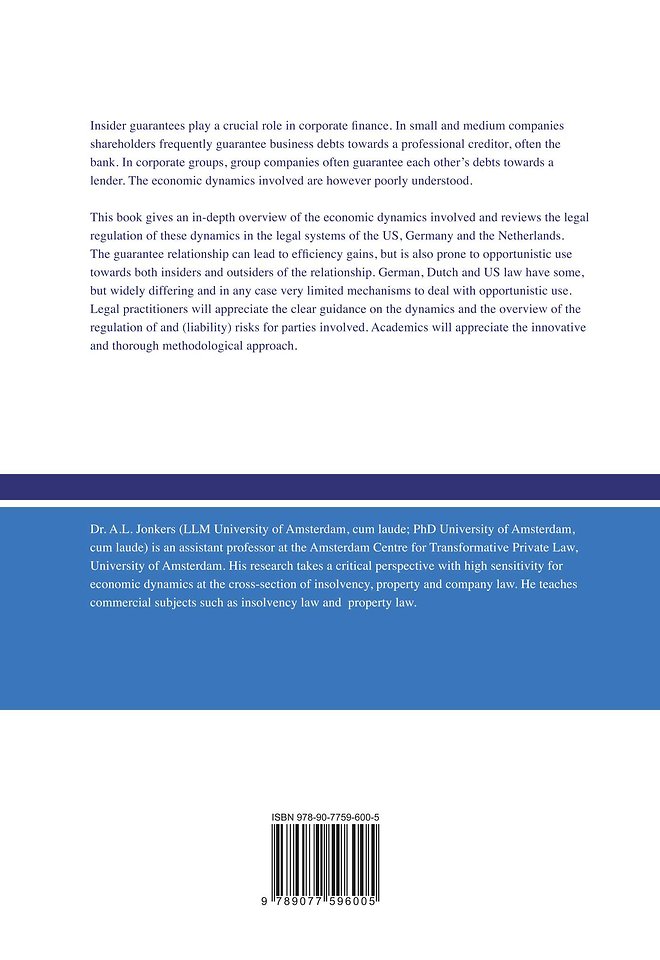Insider Guarantees in Corporate Finance
Gebonden Engels 2020 1e druk 9789077596005Samenvatting
Insider guarantees play a crucial role in corporate finance. In small and medium companies
shareholders frequently guarantee business debts towards a professional creditor, often the
bank. In corporate groups, group companies often guarantee each other’s debts towards a
lender. The economic dynamics involved are however poorly understood.
This book gives an in-depth overview of the economic dynamics involved and reviews the legal
regulation of these dynamics in the legal systems of the US, Germany and the Netherlands.
The guarantee relationship can lead to efficiency gains, but is also prone to opportunistic use
towards both insiders and outsiders of the relationship. German, Dutch and US law have some, but widely differing and in any case very limited mechanisms to deal with opportunistic use.
Legal practitioners will appreciate the clear guidance on the dynamics and the overview of the
regulation of and (liability) risks for parties involved. Academics will appreciate the innovative
and thorough methodological approach.
Trefwoorden
ondernemingsrecht financieel management garantierecht kredietverlening rechtsvergelijking corporate governance economie insolventierecht aansprakelijkheidsrecht transactiekosteneconomie mkb-financiering concernfinancierung opportunisme beperkte aansprakelijkheid signaling theory wetgeving risicobeheersing kredietbeoordeling bankrecht
Trefwoorden
Specificaties
Lezersrecensies
Inhoudsopgave
1 The guarantee relationship xiii
2 The insider guarantee in corporate finance xv
3 The agenda of this book xvii
Chapter 1 Comparative law & economics 1
1 Introduction 1
2 Comparative law & economics 1
2.1 Functionalist comparison and its limits 1
2.2 The economic perspective on law 3
2.3 Using law and economics to define a problem and to measure the effects of rules 4
2.4 Using law and economics to evaluate results of the comparison 7
2.5 Influence of comparative law on law and economics 10
2.6 Limits of the approach 11
2.7 Summary 12
3 Economics: Micro-Economics With Focus on Opportunism 13
3.1 Transaction Cost Economics and bounded rationality 14
3.2 Trust and opportunism 15
3.3 The difficulty of policing opportunism with contract law rules 17
3.4 Transaction Cost Economics and the guarantee relationship 20
3.5 Summary 21
4 Conclusion 21
Chapter 2 The beneficial economic function of the guarantee relationship in corporate finance 23
1 Introduction 23
2 Signaling 24
2.1 Adverse selection 25
2.2 Credit rationing 29
2.3 Types of guarantees suitable for signaling 32
2.4 Summary 34
3 Reducing debtor misbehavior 34
3.1 Guarantees limiting opportunistic default in general 35
3.2 Opportunistic use of limited liability and the role of guarantees 40
3.2.1 Overinvestment 44
3.2.2 Inadequate effort supply 49
3.2.3 Asset shifting/asset stripping 50
3.3 The function of other devices 51
3.4 Summary 53
4 Specialization in monitoring 54
5 Specialization in risk-bearing 56
6 Conclusion 58
Chapter 3 Opportunistic use of the guarantee relationship in corporate finance 61
1 Introduction 61
2 Opportunism towards parties inside the guarantee relationship 61
2.1 Opportunism towards a weak guarantor 62
2.2 Opportunism towards the debtor 66
2.3 Summary 70
3 Opportunism towards outsiders to the guarantee relationship 71
3.1 Ex ante opportunism: Opaque priority structures 72
3.1.1 Opaque seniority through guarantees 72
3.1.2 Justification for selective perforation of limited liability? 79
3.1.3 Justification for priority analogous to real security rights? 93
3.1.4 Justification for strong-form double proof and deficiency double proof? 99
3.1.5 The shareholder guarantee as an indirect shareholder loan 103
3.1.6 Summary 104
3.2 Ex post opportunism: covert insider dealing 105
3.2.1 Preferences in the twilight zone 106
3.2.2 Subtler forms of opportunism: feeding the lien, inefficient investment attitudes, inefficient bankruptcy filing 108
3.2.3 The inefficiency of creditor control through guarantees 111
3.2.4 Control through guarantees is more problematic than through real security rights 113
3.2.5 Specific dynamics in a reorganization procedure 114
3.2.6 Summary 116
4 Conclusion 117
Chapter 4 Dutch law on opportunism with the guarantee relationship 119
1 Introduction 119
2 Introduction to types of guarantees in Dutch law 119
2.1 Suretyship (‘borgtocht’) 120
2.1.1 The relationship between creditor-guarantor 121
2.1.2 The relationship between guarantor-principal debtor 124
2.1.3 Co-suretyship, contribution 126
2.2 Co-debtorship for security purposes (‘contractuele hoofdelijkheid’) 127
2.3 Independent guarantee (‘onafhankelijke garantie’) 129
2.4 Group guarantees for accounting purposes (‘403-verklaring’) 132
3 Dutch law on opportunism towards parties inside the guarantee relationship 132
3.1 Definition of consumer suretyship 133
3.2 Consumer protection: duty to warn the surety 135
3.3 Protection of consumer suretyship through mandatory suretyship law 139
3.4 Protection of consumer guarantors other than sureties 141
3.5 Protection of weak parties other than consumers 141
3.6 Protection of legal persons standing surety 144
3.7 The spouse 147
3.8 Protection through bankruptcy law 150
3.9 Summary 151
4 Dutch law on opportunism towards parties outside the guarantee relationship 152
4.1 Regulatory approach to opaque priority structures (ex ante opportunism) 152
4.1.1 Annulling limited liability 153
4.1.2 Avoidance of the guarantee itself 157
4.1.3 Subordinating loans guaranteed by shareholders 160
4.1.4 Disallowing double proof 161
4.2 Regulatory approaches to covert insider dealing (ex post opportunism) 164
4.2.1 Avoidance of payments on guaranteed loans 165
4.2.2 Possibilities for redress outside preference law 172
4.2.3 Shareholder liability for unlawful withdrawals outside preference law 173
4.2.4 Director liability for insider preferences 176
4.2.5 Lender tort liability for insider preferences 180
4.2.6 Specific dynamics in reorganization 182
4.2.7 Summary of Dutch law on external relations 183
5 Conclusion 184
Chapter 5 US law on opportunism with the guarantee relationship 185
1 Introduction 185
2 Introduction to types of guarantees in US law 185
2.1 Guarantees under the Restatement of Suretyship 187
2.1.1 The relationship between creditor and surety 188
2.1.2 The relationship between surety-principal debtor 191
2.1.3 Co-suretyship and sub-suretyship, contribution 194
2.2 Joint and several contractual liability 195
2.3 Independent guarantee 196
3 US law on opportunism towards parties inside the guarantee relationship 196
3.1 Specific consumer guarantor protection 197
3.2 Protection of guarantors that are legal persons 199
3.3 Protection based on general contract law between creditor and guarantor 200
3.3.1 Consideration 200
3.3.2 Statute of Frauds 201
3.3.3 Construction 201
3.4 Protection through bankruptcy law 201
3.5 Summary of US law on the internal relations 203
4 US law on opportunism towards parties outside the guarantee relationship 203
4.1 Regulatory approach to opaque priority structures (ex ante opportunism) 204
4.1.1 Annulling limited liability 205
4.1.2 Avoidance of the guarantee itself 209
4.1.3 Subordination of claims guaranteed by shareholders 212
4.1.4 Disallowing double proof 214
4.2 Regulatory approaches to covert insider dealing (ex post opportunism) 215
4.2.1 Avoidance of payments on guaranteed loans 216
4.2.2 Director liability for insider preferences 231
4.2.3 Lender liability 236
4.2.4 Bad boy guarantees 238
4.2.5 Fresh start laws 239
4.2.6 Specific dynamics in reorganization 239
4.3 Summary of US law on external relations 242
5 Conclusion 243
Chapter 6 German law on opportunism with the guarantee relationship 245
1 Introduction 245
2 Introduction to types of guarantees in German law 245
2.1 The archetype of personal security: suretyship (‘Bürgschaft’) 246
2.1.1 The relationship between creditor-guarantor 246
2.1.2 The relationship between guarantor-principal debtor 248
2.1.3 Co-suretyship, contribution 248
2.2 Co-debtorship (‘Schuldbeitritt’) and Patronatserklärung 249
2.3 Independent guarantee 251
2.4 Group guarantees for accounting purposes 251
3 German law on opportunism towards parties inside the guarantee relationship 252
3.1 Protection against immoral suretyship 253
3.1.1 Development of case law on immoral suretyship 253
3.1.2 Current state of the case law on the protection of weak sureties 254
3.1.3 Summary 257
3.2 Protection through the written form requirement 257
3.3 Consumer credit law 258
3.4 Doorstep sales law 259
3.5 Protection through unfair standard terms control 261
3.6 Protection of the spouse 263
3.7 Protection through bankruptcy law 263
3.8 Summary of German law on opportunism with the internal relationship 264
4 German law on opportunism towards parties outside the guarantee relationship 265
4.1 Regulatory approaches to opaque priority structures (ex ante opportunism) 265
4.1.1 Annulling limited liability 266
4.1.2 Not upholding the guarantee itself 270
4.1.3 Subordinating claims guaranteed by shareholders 271
4.1.4 Disallowing double proof 276
4.1.5 Summary of German law on opaque priority structures with guarantees 277
4.2 Regulatory approaches to covert insider dealing (ex post opportunism) 278
4.2.1 Avoidance of payments on guaranteed loans 278
4.2.2 Shareholder liability for unlawful withdrawals outside preference law 287
4.2.3 Director liability for insider preferences 291
4.2.4 Lender liability as de facto director 297
4.2.5 Specific dynamics in reorganization 297
4.2.6 Summary of German law on covert insider dealing 298
5 Conclusion 299
Chapter 7 Comparison & synthesis 301
1 Introduction 301
2 The beneficial function of guarantees in corporate finance 302
3 Opportunism towards parties inside the guarantee relationship 303
3.1 The problems with opportunism towards parties inside the guarantee relationship 304
3.2 The approaches of US, German and Dutch law to opportunism inside the guarantee relationship 304
3.3 Conclusions on the optimal approach to opportunism inside the guarantee relationship 305
4 Opportunism towards parties outside the guarantee relationship: (1) opaque priority structures 307
4.1 The problems with opaque priority structures 308
4.2 The approaches of US, German and Dutch law to opaque priority structures 310
4.2.1 Annulling limited liability (‘tearing down the walls’) 310
4.2.2 Avoiding the piercing guarantees (‘enforcing the walls’) 311
4.2.3 Limiting double proof 313
4.2.4 Indirectly and partially subordinating shareholderguaranteed claims 314
4.3 Conclusions on the optimal regulatory approach to opaque priority structures 316
5 Opportunism towards parties outside the guarantee relationship: (2) covert insider dealing 318
5.1 The problems with covert insider dealing 319
5.2 Approaches of US, German and Dutch law to covert insider dealing through guarantees 320
5.2.1 Transaction avoidance 320
5.2.2 Director liability 323
5.2.3 Shareholder liability 324
5.2.4 Recourse to the guaranteed lender 325
5.3 Conclusions on the optimal approach to covert insider dealing through guarantees 326
6 Conclusion 328
Conclusion & Recommendations 329
Literature & case law 339
Anderen die dit boek kochten, kochten ook
Rubrieken
- advisering
- algemeen management
- coaching en trainen
- communicatie en media
- economie
- financieel management
- inkoop en logistiek
- internet en social media
- it-management / ict
- juridisch
- leiderschap
- marketing
- mens en maatschappij
- non-profit
- ondernemen
- organisatiekunde
- personal finance
- personeelsmanagement
- persoonlijke effectiviteit
- projectmanagement
- psychologie
- reclame en verkoop
- strategisch management
- verandermanagement
- werk en loopbaan









